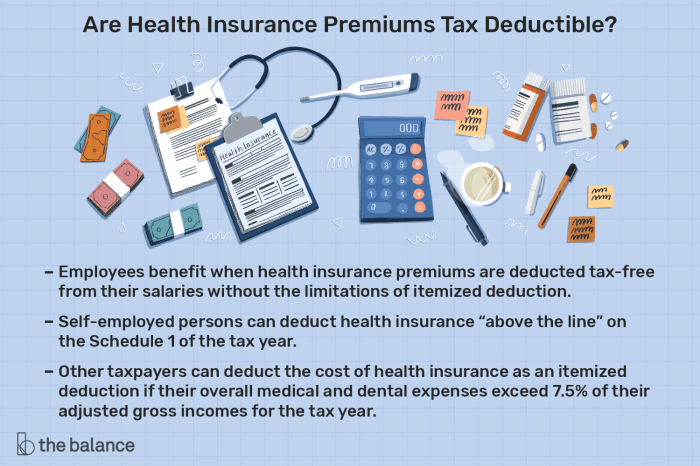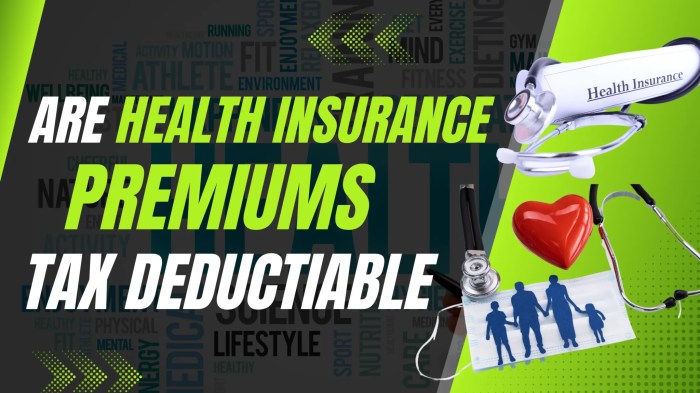Navigating the complexities of the US tax system can be daunting, particularly when it comes to healthcare expenses. Understanding the deductibility of health insurance premiums is crucial for taxpayers, impacting their overall tax liability. This guide delves into the intricacies of claiming this deduction in 2023, clarifying eligibility criteria, calculation methods, and the influence of factors like self-employment, employer-sponsored plans, and the Affordable Care Act (ACA). Whether you’re self-employed, employed, or navigating the complexities of family coverage, this resource offers clarity and practical guidance.
We will explore the various scenarios where health insurance premium deductions are permitted, highlighting key differences between itemized and standard deductions. Furthermore, we’ll examine the impact of state-specific regulations and the importance of meticulous record-keeping to ensure a smooth and successful tax filing process. By the end, you’ll have a solid grasp of how to maximize your tax benefits related to health insurance premiums.
Employer-Sponsored Health Insurance

Employer-sponsored health insurance represents a significant tax advantage for many employees. Understanding how these plans are treated under the tax code is crucial for both employees and employers. This section will detail the tax implications of employer-sponsored health insurance, comparing them to individually purchased plans and highlighting situations where deductions might still be possible.
Employer-sponsored health insurance premiums are generally not taxed as income to the employee. The value of the employer’s contribution towards the premium is considered a non-taxable fringe benefit. This means that the money your employer contributes towards your health insurance isn’t added to your taxable income. This is a substantial benefit, saving employees a considerable amount in taxes each year. The employee only pays taxes on the portion of the premium they contribute, if any.
Tax Implications Compared to Individually Purchased Plans
Employees with employer-sponsored health insurance enjoy a significant tax advantage compared to those who purchase their own insurance. Those who purchase individual plans must pay the full premium themselves, and this premium is not tax deductible for most individuals. The tax burden falls entirely on the employee, whereas with employer-sponsored plans, a portion – often a substantial portion – is covered by the employer, tax-free. This results in a lower overall tax liability for employees with employer-sponsored coverage.
Situations Where Deductions Might Still Apply
While employer-sponsored health insurance premiums are generally not deductible, there are limited exceptions. Self-employed individuals, for example, can often deduct a portion of their health insurance premiums as a business expense. This deduction is available if they meet specific criteria, which include being self-employed or a freelancer and actively participating in a trade or business. Furthermore, some individuals may be able to deduct premiums paid for long-term care insurance, though this depends on specific circumstances and may be subject to limitations.
Comparison of Tax Benefits
| Feature | Employer-Sponsored Plan | Individually Purchased Plan |
|---|---|---|
| Premium Tax Treatment | Employer contribution is tax-free; employee contribution may be partially or fully taxable depending on the plan. | Full premium is paid by the employee and is generally not tax-deductible (exceptions apply for the self-employed as noted above). |
| Tax Savings | Significant tax savings due to the employer’s tax-free contribution. | No direct tax savings related to premiums; potential indirect savings through itemized deductions in limited circumstances. |
| Tax Liability | Lower overall tax liability compared to individually purchased plans. | Higher overall tax liability due to the full cost of the premium being borne by the employee. |
Documentation and Record Keeping

Maintaining meticulous records of your health insurance premiums is crucial for successfully claiming the tax deduction. Accurate documentation not only ensures a smooth tax filing process but also protects you from potential audits and ensures you receive the full tax benefit you’re entitled to. Failing to keep proper records could result in delays or rejection of your deduction claim.
Proper documentation supports your claim for the deduction of health insurance premiums. The specific documents required depend on your situation, particularly whether you obtained insurance through your employer or purchased it individually. The IRS requires substantial evidence to verify your expenses.
Required Documentation for Health Insurance Premium Deduction
Supporting documentation for the deduction of health insurance premiums typically includes forms issued by your insurance provider and/or your employer. These documents provide verification of your payments and the coverage details. For those with employer-sponsored plans, a Form 1095-B is generally provided, detailing the plan’s details and the months you were covered. For those who purchased insurance through the Marketplace, a Form 1095-A will be provided, showing details of your coverage and the premium assistance received, if any. In addition to these forms, you should retain copies of your premium payment statements, bank statements showing payments, and your insurance policy itself.
Examples of Acceptable and Unacceptable Documentation
Acceptable documentation includes official IRS forms (1095-A or 1095-B), insurance premium payment receipts, cancelled checks, bank statements showing automatic payments, and a copy of your insurance policy. These documents provide clear evidence of your insurance coverage and premium payments. Unacceptable documentation would be things like vague or undocumented cash payments, estimates of premiums, or informal notes about payments made. Remember, the IRS requires verifiable proof. For example, a simple statement claiming you paid premiums is insufficient; you need concrete evidence to back up your claim.
Documentation Checklist for Tax Filing
Before filing your taxes, use this checklist to ensure you have all necessary documentation:
- Form 1095-A (if applicable): This form details your health insurance coverage purchased through the Marketplace.
- Form 1095-B (if applicable): This form Artikels your employer-sponsored health insurance coverage.
- Copies of all premium payment receipts or statements: These should clearly show the date, amount, and payment method.
- Bank statements showing automatic payments (if applicable): This corroborates your payments.
- Copy of your insurance policy: This provides details of your coverage plan.
- Any other documentation related to premium payments or health insurance expenses, such as proof of payment for COBRA continuation coverage.
Closure

Successfully navigating the tax implications of health insurance premiums requires a thorough understanding of eligibility criteria, applicable regulations, and meticulous record-keeping. While the process can seem intricate, this guide provides a framework for individuals to confidently determine their eligibility for deductions and accurately claim them on their tax returns. Remember to consult with a qualified tax professional for personalized advice tailored to your specific circumstances. Proper planning and documentation are key to minimizing your tax burden and ensuring compliance with all relevant tax laws.
Question & Answer Hub
What forms do I need to support my health insurance premium deduction?
Common forms include Form 1095-B (for employer-sponsored insurance) and Form 1095-A (for Marketplace coverage). You’ll also need records of your premium payments.
Can I deduct premiums if I’m on Medicare?
Generally, Medicare premiums are not deductible. However, there may be exceptions for certain situations; consult a tax professional for specific guidance.
What if I have both employer-sponsored insurance and a separate individual policy?
Deductibility depends on the specifics of your situation. Employer-sponsored insurance premiums are usually not deductible, but premiums for an additional individual policy might be, depending on your eligibility and whether you itemize.
What happens if I overpay my estimated taxes related to self-employment health insurance deductions?
You should receive a refund of the overpayment when you file your annual tax return.